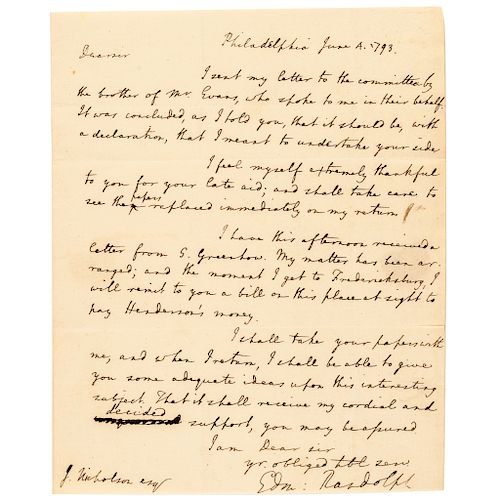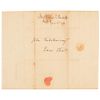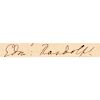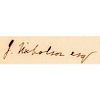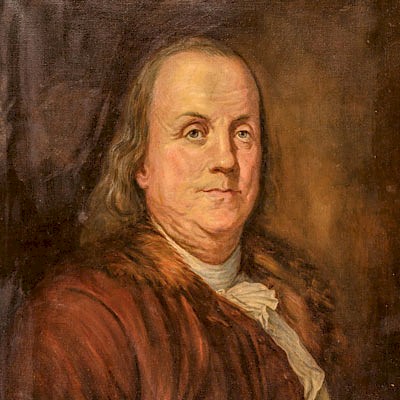1793 EDMUND RANDOLPH, Washingtons 1st US Attorney General ALS to John Nicholson
Lot 74
Estimate:
$800 - $1,200
Absentee vs Live bid
Two ways to bid:
- Leave a max absentee bid and the platform will bid on your behalf up to your maximum bid during the live auction.
- Bid live during the auction and your bids will be submitted real-time to the auctioneer.
Bid Increments
| Price | Bid Increment |
|---|---|
| $0 | $10 |
| $200 | $20 |
| $300 | $25 |
| $500 | $50 |
| $1,000 | $100 |
| $2,000 | $200 |
| $3,000 | $250 |
| $5,000 | $500 |
| $10,000 | $1,000 |
| $20,000 | $2,000 |
| $30,000 | $2,500 |
| $50,000 | $5,000 |
| $100,000 | $10,000 |
| $200,000 | $20,000 |
| $300,000 | $25,000 |
| $500,000 | $50,000 |
About Auction
By Early American History Auctions
Aug 24, 2019
Set Reminder
2019-08-24 12:00:00
2019-08-24 12:00:00
America/New_York
Bidsquare
Bidsquare : Autographs, Colonial Currency, Political Americana, Historic Guns
https://www.bidsquare.com/auctions/early-american-history-auctions/autographs-colonial-currency-political-americana-historic-guns-4347
Historic Autographs • Colonial Currency • American Civil War Colonial Era • Revolutionary War • Political Americana • Black History Early American History Auctions auctions@earlyamerican.com
Historic Autographs • Colonial Currency • American Civil War Colonial Era • Revolutionary War • Political Americana • Black History Early American History Auctions auctions@earlyamerican.com
- Lot Description
Autographs
1793 President George Washington's First United States Attorney General Edmund Randolph ALS to John Nicholson
EDMUND JENNINGS RANDOLPH (1753-1813). Aide to General George Washington, American Attorney, 7th Governor of Virginia, 2nd U.S. Secretary of State, Appointed the First United States Attorney General by President George Washington.
June 4, 1793-Dated Federal Period, Autograph Letter Signed, "Edm: Randolph" as U.S. Secretary of State, with Integral Transmittal Cover, measuring 7.5" x 9.25", Philadelphia, Choice Very Fine. This finacial related Letter is fully written in Randolph's own hand in deep rich brown on clean laid period paper to financier John Nicholson, then acting Comptroller General of Pennsylvania (1782-1794). It reads, in full:
"Philadelphia - June 4, 1793 -- Dear sir -- I sent my letter to the committee by the brother of Mr. Evans, who spoke to me in their behalf. It was concluded, as I told you, that it should be, with a declaration, that I meant to undertake your side. I feel myself extremely thankful to you for your late aid; and shall take care to see the papers replaced immediately on my return. I have this afternoon received a letter from S. Greenhow. My matter has been arranged; and the moment I get to Fredericksburg, I will remit to you a bill on this place at sight to pay Henderson's money. I shall take your papers with me, and when I return, I shall be able to give you some adequate ideas upon this interesting subject. That it shall receive my cordial and decided support, you may be assured." Also, fully addressed on the Integral leaf in Randolph's own hand, his signature clearly executed at the letter's conclusion. Scarce, having nice eye appeal and a pleasing appearance.
JOHN NICHOLSON (1757-1800), was a Pennsylvania Industrialist and Financier, was a Clerk of the Board of Treasury of the Continental Congress (1778-1781), resigning that post to become Comptroller General of Pennsylvania (1782-1794).
Nicholson was Impeached in 1793, accused of financial mismanagement and corruption, but escaped removal from office when the vote in the Pennsylvania Senate fail short of the two-thirds needed for conviction. He resigned, however, shortly thereafter.
In 1795, he entered into a series of speculative land ventures with Robert Morris, the chief financier of the American Revolution. In 1796, the year he signed this promissory note, the partners formed the North American Land Company. The venture went bankrupt, landing both Morris and Nicholson in debtors' prison in 1799. Morris had many friends, including President Washington and a grateful Congress, who helped secured his release. Nicholson was less fortunate. He died in 1800, leaving a wife, eight children, and $4 million in debts.
- Shipping Info
-
Early American provides in-house worldwide shipping. Please contact us directly if you have questions about your specific shipping requirements.
-
- Buyer's Premium



 EUR
EUR CAD
CAD AUD
AUD GBP
GBP MXN
MXN HKD
HKD CNY
CNY MYR
MYR SEK
SEK SGD
SGD CHF
CHF THB
THB